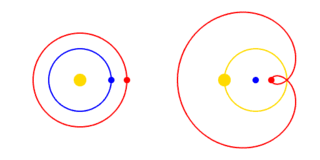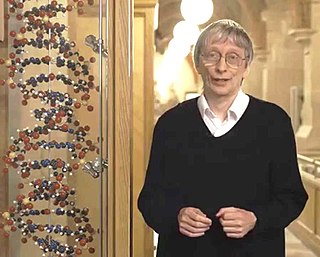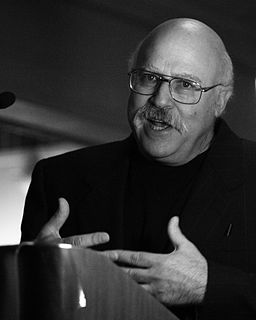 W
WThe Bibliotheca Alexandrina is a major library and cultural center on the shore of the Mediterranean Sea in the Egyptian city of Alexandria. It is both a commemoration of the Library of Alexandria that was lost in antiquity, and an attempt to rekindle something of the brilliance that this earlier center of study and erudition represented. The idea of reviving the old library dates back to 1974, when a committee set up by Alexandria University selected a plot of land for its new library. Construction work began in 1995 and, after some US$220 million had been spent, the complex was officially inaugurated on 16 October 2002. In 2010, the library received a donation of 500,000 books from the Bibliothèque nationale de France (BnF). The gift makes the Bibliotheca Alexandrina the sixth-largest Francophone library in the world.
 W
WThe Beginning of Infinity: Explanations that Transform the World is a popular science book by the physicist David Deutsch first published in 2011.
 W
WThe Copernican Revolution was the paradigm shift from the Ptolemaic model of the heavens, which described the cosmos as having Earth stationary at the center of the universe, to the heliocentric model with the Sun at the center of the Solar System. This revolution consisted of two phases; the first being extremely mathematical in nature and the second phase starting in 1610 with the publication of a pamphlet by Galileo. Beginning with the publication of Nicolaus Copernicus’s De revolutionibus orbium coelestium, contributions to the “revolution” continued until finally ending with Isaac Newton’s work over a century later.
 W
WThe Netherlands had a considerable part in the making of modern society. The Netherlands and its people have made numerous seminal contributions to the world's civilization, especially in art, science, technology and engineering, economics and finance, cartography and geography, exploration and navigation, law and jurisprudence, thought and philosophy, medicine, and agriculture. Dutch-speaking people, in spite of their relatively small number, have a significant history of invention, innovation, discovery and exploration. The following list is composed of objects, (largely) unknown lands, breakthrough ideas/concepts, principles, phenomena, processes, methods, techniques, styles etc., that were discovered or invented by people from the Netherlands and Dutch-speaking people from the former Southern Netherlands. Until the fall of Antwerp (1585), the Dutch and Flemish were generally seen as one people.
 W
WThe Netherlands and its people have made numerous contributions to the world's civilization in art, science, technology and engineering, economics and finance, cartography and geography, exploration and navigation, law and jurisprudence, thought and philosophy, medicine. and agriculture. The following list is composed of objects, (largely) unknown lands, breakthrough ideas/concepts, principles, phenomena, processes, methods, techniques, styles etc., that were discovered or invented by people from the Netherlands and Dutch-speaking people from the former Southern Netherlands. Until the fall of Antwerp (1585), the Dutch and Flemish were generally seen as one people.
 W
WThe Netherlands and its people have made contributions to in arts, science, technology and engineering, economics and finance, cartography and geography, exploration and navigation, law and jurisprudence, thought and philosophy, medicine. and agriculture. The following list is composed of objects, (largely) unknown lands, breakthrough ideas/concepts, principles, phenomena, processes, methods, techniques, styles etc., that were discovered or invented by people from the Netherlands and Dutch-speaking people from the former Southern Netherlands. Until the fall of Antwerp (1585), the Dutch and Flemish were generally seen as one people.
 W
WEncyclopédie, ou dictionnaire raisonné des sciences, des arts et des métiers, better known as Encyclopédie, was a general encyclopedia published in France between 1751 and 1772, with later supplements, revised editions, and translations. It had many writers, known as the Encyclopédistes. It was edited by Denis Diderot and, until 1759, co-edited by Jean le Rond d'Alembert.
 W
WThe Age of Enlightenment was an intellectual and philosophical movement that dominated the world of ideas in Europe during the 17th and 18th centuries.
 W
WThis is a list of intellectuals from the Age of Enlightenment.
 W
WThe history of science during the Age of Enlightenment traces developments in science and technology during the Age of Reason, when Enlightenment ideas and ideals were being disseminated across Europe and North America. Generally, the period spans from the final days of the 16th and 17th-century Scientific Revolution until roughly the 19th century, after the French Revolution (1789) and the Napoleonic era (1799–1815). The scientific revolution saw the creation of the first scientific societies, the rise of Copernicanism, and the displacement of Aristotelian natural philosophy and Galen's ancient medical doctrine. By the 18th century, scientific authority began to displace religious authority, and the disciplines of alchemy and astrology lost scientific credibility.
 W
WThe Fourth Paradigm: Data-intensive Scientific Discovery is a 2009 anthology of essays on the topic of data science. Editors Tony Hey, Kristin Michele Tolle, and Stewart Tansley claim in the book's description that it presents the first broad look at the way that increasing use of data is bringing a paradigm shift to the nature of science.
 W
WAntonie Philips van Leeuwenhoek was a Dutch businessman and scientist in the Golden Age of Dutch science and technology. A largely self-taught man in science, he is commonly known as "the Father of Microbiology", and one of the first microscopists and microbiologists. Van Leeuwenhoek is best known for his pioneering work in microscopy and for his contributions toward the establishment of microbiology as a scientific discipline.
 W
WThe Midlands Enlightenment, also known as the West Midlands Enlightenment or the Birmingham Enlightenment, was a scientific, economic, political, cultural and legal manifestation of the Age of Enlightenment that developed in Birmingham and the wider English Midlands during the second half of the eighteenth century.
 W
WThe scientific method is an empirical method of acquiring knowledge that has characterized the development of science since at least the 17th century. It involves careful observation, applying rigorous skepticism about what is observed, given that cognitive assumptions can distort how one interprets the observation. It involves formulating hypotheses, via induction, based on such observations; experimental and measurement-based testing of deductions drawn from the hypotheses; and refinement of the hypotheses based on the experimental findings. These are principles of the scientific method, as distinguished from a definitive series of steps applicable to all scientific enterprises.
 W
WThe Scottish Enlightenment was the period in 18th- and early-19th-century Scotland characterised by an outpouring of intellectual and scientific accomplishments. By the eighteenth century, Scotland had a network of parish schools in the Lowlands and four universities. The Enlightenment culture was based on close readings of new books, and intense discussions took place daily at such intellectual gathering places in Edinburgh as The Select Society and, later, The Poker Club, as well as within Scotland's ancient universities.
 W
WSteven Shapin is an American historian and sociologist of science. He is the Franklin L. Ford Research Professor of the History of Science at Harvard University. He is considered one of the earliest scholars on the sociology of scientific knowledge, and is credited with creating new approaches. He has won many awards, including the 2014 George Sarton Medal of the History of Science Society for career contributions to the field.
 W
WBaruch (de) Spinoza was a Dutch philosopher of Portuguese Sephardi origin. One of the early thinkers of the Enlightenment and modern biblical criticism, including modern conceptions of the self and the universe, he came to be considered one of the great rationalists of 17th-century philosophy. Inspired by the groundbreaking ideas of René Descartes, Spinoza became a leading philosophical figure of the Dutch Golden Age. Spinoza's given name, which means "Blessed", varies among different languages. In Hebrew, it is written ברוך שפינוזה. In the Netherlands he used the Portuguese name Bento. In his Latin and Dutch works, he used Latin: Benedictus de Spinoza.
 W
WThe Structure of Scientific Revolutions is a book about the history of science by the philosopher Thomas S. Kuhn. Its publication was a landmark event in the history, philosophy, and sociology of scientific knowledge. Kuhn challenged the then prevailing view of progress in science in which scientific progress was viewed as "development-by-accumulation" of accepted facts and theories. Kuhn argued for an episodic model in which periods of conceptual continuity where there is cumulative progress, which Kuhn referred to as periods of "normal science", were interrupted by periods of revolutionary science. The discovery of "anomalies" during revolutions in science leads to new paradigms. New paradigms then ask new questions of old data, move beyond the mere "puzzle-solving" of the previous paradigm, change the rules of the game and the "map" directing new research.